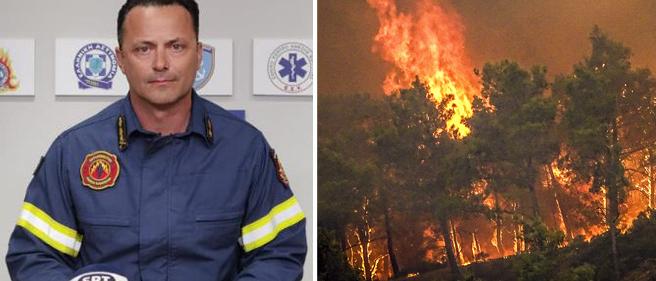For almost a week, fires have been ravaging the Greek island of Rhodes and on Sunday fires flared up on the island of Corfu.
More regions are now threatened by the extreme heat and several countries are helping in the rescue work.
“The international contributions are crucial,” says Ioannis Artopios, spokesperson for the Greek Fire Authority.
Quick version
ⓘ The summary is made with the support of AI tools from OpenAI and quality assured by Aftonbladet. Read our AI policy here.
Show more
During Monday, there are still fires in several places in Greece. The rescue efforts are in full swing and a large number of people have been evacuated as a result of the fires.
“It is the largest evacuation of residents and tourists ever carried out in Greece,” the authorities write.
The Greek coast guard stated on Monday morning that roughly 3,700 people had been evacuated from beaches via boats.
Rhodes
During Sunday night, the extinguishing work on the island of Rhodes has continued and according to the local fire service, the fire has gained new momentum, writes the Greek newspaper Kathimerini.
The fire has mainly gained new momentum in the southern part of the island near the village of Asklipio. Both airplanes and helicopters from Turkey, Croatia and Egypt are used in the extinguishing work.
During the morning, the temperature should have dropped slightly, which has improved the conditions. But when it burns in several places within a large area, there is a great risk that the fire will continue to spread.
According to the BBC, the deputy mayor of Rhodes, Athanasios Vyrinis, said that “There is only water and simple food. We don’t have mattresses and beds”
According to the mayor, people have had to use cardboard boxes to sleep in and those arriving in Rhodes have nowhere to stay.
Corfu
In the north-eastern part of the island of Corfu there is still a fire. According to the fire brigade, the fire did not reach any buildings. During the night, several areas were evacuated and emergency messages were sent out.
The mayor of North Corfu, Giorgos Mahimaris, has spoken in his statements that the fires may be arson, as three of the fires broke out at the same time.
Eva
On the island of Evia outside Athens, several villages have been evacuated after fires broke out. According to the fire authority, a new fire must have flared up during the morning.
Several airplanes and helicopters are involved in the extinguishing work, which is made more difficult by strong winds in the area.
Warnings across the country
The Greek Ministry of Climate Crisis and Civil Protection warns of a high risk of fire in large parts of Greece right now and urges people to be extra careful and “avoid actions in the open that could cause a fire”.
Among other things, people are asked not to throw fags, use tools that give off sparks and not to grill outdoors.
In the regions around the capital Athens, the most serious warning prevails on a five-point scale. The same warning is also issued in Rhodes and surrounding islands and in the Peloponnese region and parts of western Greece.
In larger parts of the country, the most serious warning prevails, sometimes on the island of Crete.
Not sure that the resources are enough
Although large resources are used in the extinguishing work, researcher Gavriil Xanthopoulos, at the Institute for Mediterranean Forests and Ecosystems and Forest Product Technology, believes that the resources may not be sufficient.
“We increase our forces, we can put out fires up to a certain level, but without forestry we build up biomass that makes the next incident more explosive,” he says to the newspaper Ekathimerini.
He believes that a “forest fire paradox” arises, where more resources can be added to the fire service, but as long as flammable material accumulates in the forests, the fires that do start are difficult to put out.
Although Greece has increased its number of firefighting planes and helicopters, Xanthopoulos believes that it may not be enough, if the underlying causes of the fires are not addressed.
